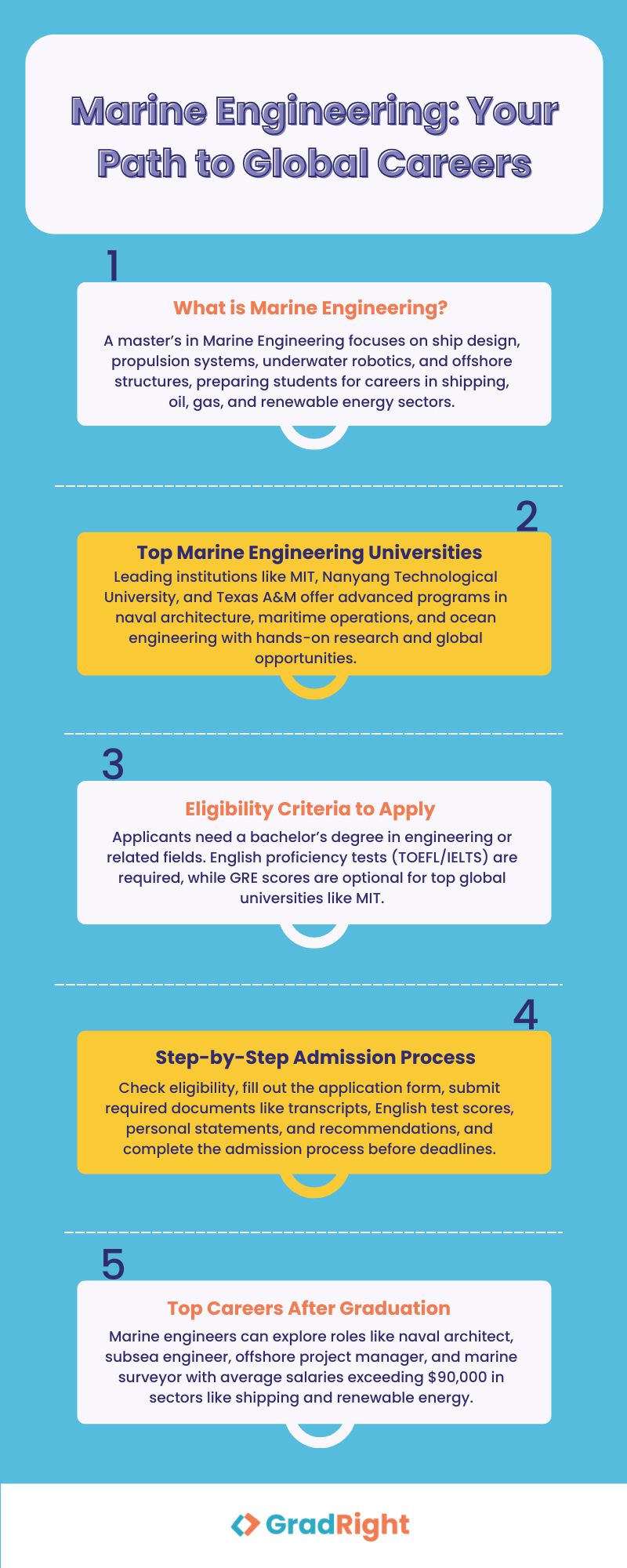Comprehensive Guide to Marine Engineering: Programs, Careers, and Opportunities
Did you know?
Around 80% of the world’s goods are transported by ships.
This means if you choose a career in marine engineering, your contribution will be pivotal in world trade logistics. From shipbuilding to robotics to eco-friendly innovations, read this blog to know everything about a marine engineering program.

What is a Marine Engineering course?
A Master’s program in Marine Engineering is a one to two-year-long degree that helps students build a career in oil, gas, shipbuilding, maritime transportation, etc. The program deals with advanced concepts in the following areas:
- Propulsion systems
- Ship design
- Underwater vehicle technologies
- Maritime operations
- Offshore structures
- Naval architecture
- Maritime environment and management
- Marine hydrodynamics, etc.
To pursue this program, you need a bachelor’s degree in a relevant field or any advanced engineering field. More of the top marine engineering universities don’t require the GRE. Read more on these universities and specific program requirements next.
Top colleges for a Marine Engineering program
Here is a list of the seven best colleges for Marine Engineering in the world offering master’s programs:
| Colleges/ Universities | QS World University Ranking 2025 | Relevant Master’s Programs Offered |
| Massachusetts Institute of Technology (MIT), USA | 1 | Master of Science in Naval Architecture and Marine Engineering (SMNAME), Master of Science in Ocean Engineering (SMOE) |
| Nanyang Technological University, Singapore | 15 | Master of Science in Maritime Studies |
| Texas A&M University, USA | 154 | Master of Science Ocean Engineering |
| University of Aberdeen, UK | =236 | MSc in Offshore Engineering, MSc in Subsea Engineering |
| University of Auckland, New Zealand | 65 | Master of Science (MSc) in Marine Science, Master of Marine Studies |
| Newcastle University, UK | 129 | Marine Technology Education Consortium MSc, Maritime Engineering MSc, Marine Technology MSc |
| Florida Institute of Technology, USA | =215 | MS in Marine Biology, MS in Ocean Engineering, MS in Oceanography |
Now, let’s explore some of these colleges and the Marine Engineering programs offered by them in detail:
#1 Marine Engineering college in the world – MIT
The Department of Mechanical Engineering at MIT offers the following relevant Marine Engineering programs:
- Master of Science in Naval Architecture and Marine Engineering (SMNAME)
- Master of Science in Ocean Engineering (SMOE)
- Master of Science in Oceanographic Engineering (SMOGE)
These programs require you to complete 72 graduate-level credit units and a thesis. Some of the subjects/ areas included in the SMOE program are:
- Marine Hydrodynamics
- Professional practice in ocean environment (e.g., Design Principles for Ocean Vehicles)
- Acoustics and Sensing or Structural Mechanics or Structural Dynamics
Some subjects included in the SMNAME program are:
- Marine Hydrodynamics and their area of concentration
- Introduction to Naval Architecture, Ship Power, and Propulsion
The applications for these programs will open on 15th September 2025 and close on 15th December 2025. The university doesn’t require GRE scores for admissions. You will, however, must submit your TOEFL/IELTS test scores, along with the following documents:
- A statement of objectives
- At least three letters of recommendation
- Academic transcripts
- A complete application form
#2 Marine Engineering college in the world – Nanyang Technological University, Singapore
The School of Civil and Environmental Engineering (CEE) offers a Master of Science in Maritime Studies program. It’s available on a full-time and part-time basis and requires 30 units to complete. Here are the core courses and electives included in the program’s curriculum:
Core courses:
| Course Title | AUs |
| Project Management | 3 |
| Maritime Economics | 3 |
| Shipping Management I | 3 |
| Shipping Management II | 3 |
Electives:
| Courses | Units |
| Strategic Planning | 3 |
| Cross Cultural Management | 3 |
| International Business Financing & Insurance | 3 |
| Ship Operations, Brokering, and Chartering | 3 |
| Maritime Logistics | 3 |
| Port Management | 3 |
| Environmental Shipping | 3 |
For the applications, the online portal for program admissions remains open from November to January for the August intake and from July to August for the January intake.
#3 Marine Engineering college in the world – Texas A&M University
The Department of Ocean Engineering at Texas A&M offers a Master of Engineering program. To graduate, you must complete at least 30 credit hours and a project report. You must hold a bachelor’s degree in a relevant engineering discipline. If not, you may have to complete pre-requisite courses in topics like mechanics of materials, fluid mechanics, and dynamics.
The Master of Engineering program at Texas A&M University includes various ocean engineering fields and their advanced capabilities. Some of the courses/ fields are:
- Off-shore-energy (gas, oil, and renewables)
- Coastal works
- Underwater robotics
- Naval architecture
As an international student, you must prove your proficiency in the English language to apply for the program. The application deadlines for different intakes are as follows:
- Fall semester: 15th April
- Spring semester: 15th September
#4 Marine Engineering college in the world – University of Aberdeen
The University of Aberdeen offers an MSc in Offshore Engineering and an MSc in Subsea Engineering. Both programs are taught on campus for 12 months. These full-time programs begin in January and September. Both programs hold high accreditations from the following institutions:
- Chartered Institution of Highways & Transportation (CIHT)
- The Energy Institute
- Institution of Structural Engineers (IStructE)
- Institution of Civil Engineers (ICE)
- The Institute of Marine Engineering, Science & Technology
- Institution of Mechanical Engineers
- Institute of Highway Engineers (IHE)
The Subsea Engineering program is also recognized by the Global Centre of Excellence for Subsea Development and Operations and has a tuition fee of £26,250 per annum for international students. The program curriculum is divided into three stages and includes the following topics:
| Stage I |
|
| Stage II |
|
| Stage III | Individual project |
The tuition fee for the Offshore Engineering program is the same, £26,250 per annum. However, instead of stages, it’s divided into three semesters. The courses included in the program curriculum are:
| Semesters | Compulsory Courses | Optional Courses |
| Semester I |
|
You must pick one of the following:
|
| Semester II |
|
You must pick two of the following:
|
| Semester III | Individual project | — |
#5 Marine Engineering college in the world – University of Auckland
The University of Auckland offers a one-year MSc in Marine Science and an 18-month Master of Marine Studies program. The latter is offered full-time and requires 180 points to graduate.
The programs combine marine science with practical skills in environmental management, research design, and field techniques. After graduating, you can explore opportunities in the following roles:
- Aquaculture technician
- Researcher
- Conservation ranger
- Fishery analyst
- Environmental consultant
- Marine biologist
- Marine technician
The estimated annual tuition fee for international students is NZ$52,842. The university offers financial assistance through scholarships, awards, loans, and allowances if you can’t afford the tuition.
The five universities we covered are just the tip of the iceberg. While they are top-ranked, the best university for you depends on factors like location, cost, career goals, and program structure. That’s where GradRight’s university-search platform helps.
GradRight uses 8 million+ data points across 40,000 programs in 4,000 universities to match you with the best options tailored to your preferences. It factors in ROI, alumni success, job opportunities, and more to suggest universities that truly fit your profile. You can connect with advisors to clear doubts and make confident decisions. No more endless searches or relying on rankings alone. Receive details on scholarships and funding options for the shortlisted programs.
Here’s how you can use GradRight.
- Create Your Profile: Share your academic and career details.
- Set Your Criteria: Specify what matters most—cost, ROI, location, etc.
- Get Your Shortlist: Let the AI generate universities that fit your preferences.
- Ask Questions: Consult experts to clarify any doubts about applications or programs.
- Finalize and Apply: Use the insights and guidance to make an informed choice.
Now that you know how to find the right university, let’s move on to discuss who can pursue a program in Marine Engineering.
Who can pursue a program in Marine Engineering?
Now that you have gone through the world’s top Marine Engineering colleges let’s find out why you should pursue a program in the field. Various master’s programs in this field deal with:
- Offshore structures,
- Advanced marine systems,
- Sustainable technologies and
- Oil and gas industries.
Do these areas fascinate you and make you want to pursue a relevant career? A program in Marine Engineering would be a great option for you. But the real question is, can you pursue it?
It depends on the eligibility criteria that different universities stipulate, which we’ll discuss below. However, one of the most important factors that weigh heavily on your eligibility assessment is whether you hold a bachelor’s degree in a relevant engineering field.
Apart from the academic aspects of the program, you must also be interested in the opportunities it offers. For instance, this field can provide you with international opportunities. If you’re passionate about Marine Engineering & technology and seeking global adventure, the program can be an excellent option.
Keep reading the next section for more details on program requirements to determine if you can pursue the program.
Eligibility criteria for a Marine Engineering program
The eligibility criteria for a Marine Engineering program vary for universities and countries. So, let’s have a look at the program requirements at two universities from different countries to understand the requirements:
Eligibility criteria for a Marine Engineering program at MIT, USA
{Although the majority of the applicants hold a bachelor’s degree in mechanical or ocean engineering, the institute is not specific in regard to the criteria.} However, you must hold a bachelor’s degree in science or engineering to apply. You must have exposure to the following disciplines:
- Thermodynamics
- Dynamics
- Solid mechanics
- Fluid mechanics heat transfer
- Control, design, and manufacturing
- Materials
The institute doesn’t require your GRE scores. However, you must submit your English test scores. The minimum acceptable score in IELTS is 7.0, and 100 in TOEFL IBT.
Eligibility criteria for a Marine Engineering program at Nanyang Technological University, Singapore
You must:
- Hold a bachelor’s degree in business, shipping, or relevant disciplines.
- Hold a CoC1 (Certificate of Competency 1).
- Submit your IELTS/ TOEFL scores if your bachelor’s degree wasn’t conducted in English. The minimum score requirements are mentioned below:
| Tests | Minimum Scores Required |
| TOEFL (Paper-based) | 600 |
| TOEFL (Computer-based) | 250 |
| TOEFL (Internet-based) | 85 |
| IELTS (Academic) | 6.0 |
As for other standardized tests like GRE and GMAT, the university doesn’t require them.
Marine Engineering admission process
Similar to eligibility criteria, the admission process for Marine Engineering programs may also vary between universities and countries. However, some steps are common at most universities abroad. Have a look at them:
- Meet the Eligibility Criteria:
- Go through the program detail page on your intended university’s website and check the requirements.
- Make sure you are eligible to apply for the program.
- Begin your application:
- After ensuring your eligibility, check if the applications for the program are live.
- If yes, begin filling out your application form.
- Many sections on the form will require you to enter information from your academic transcripts and other documents. Make sure that the information matches.
- Submit Your Documents:
Some documents can be directly attached to your application form, while others need to be mailed by your institution or an individual. Here’s a list of documents required by universities for admission to a program in Marine Engineering:
- Officially translated (in English) academic transcripts
- Academic certificates
- English test scores
- GRE/ GMAT (if required)
- Your updated CV/ resume
- A personal statement or essays
- Letter/s of recommendation
- Submit Your Application:
Once you have completed the above steps, submit your application. You will receive a notification when your submission is successful.
Top entrance exams for a Marine Engineering program in 2025
If you are interested in pursuing a master’s program in Marine Engineering abroad, the only entrance exams you may require are the GRE and English tests. Top universities like MIT and Nanyang Technological University don’t require a GRE. In those cases, you would only need to take an English test to prove your proficiency in the language.
However, if you are interested in pursuing the program in India, you must appear in the entrance exams. Top institutions like IITs and IMU accept the following entrance exams:
- JEE Main
- TS EAMCET
- MHT CET
- JEE Advanced
- CUET
- KCET
- BITSAT
- COMEDK UGET
- WBJEE
- VITEEE
- KEAM
- GATE
Scope for the Marine Engineering program
You can explore many academic and professional paths with a Marine Engineering program. You can either pursue doctoral programs and conduct research in the relevant field or step into the workforce.
A marine engineer in the USA earns an average base salary of $90,999 per annum. You can explore career opportunities in the following roles:
- Offshore Engineer
- Analysis Engineer
- Marine Engineer
- Marine Contractor
- Ship Engineer
- Subsea Field Engineer
- Marine Surveyor
- Subsea Installation Engineer
- Naval Architect
- Project Engineer
- Research Engineer
Primary sectors like shipping, naval architecture, oil and gas, renewable energy, and shipbuilding are among the top recruiters.
FAQs
1. What are the basic things to know about Marine Engineering?
Marine engineering deals with constructing, maintaining, and designing maritime machinery and structures. This field merges expertise in electrical, naval, and mechanical architecture.
Question 2. What do you need to be a marine engineer?
To become a marine engineer, you must hold a bachelor’s or master’s degree in the relevant engineering field. You must also be proficient in mathematics, physics, and the following areas:
- Thermodynamics
- Dynamics
- Solid mechanics
- Fluid mechanics heat transfer
- Control, design, and manufacturing
- Materials
3. How do I prepare for Marine Engineering?
To prepare for a career in marine engineering, you must pursue a relevant degree. You can also intern in maritime companies or shipyards to get acquainted with the field.
4. Is Marine Engineering hard to study?
The difficulty level of studying marine engineering varies for individuals. However, since this field is multidisciplinary, it’s often considered challenging.


















